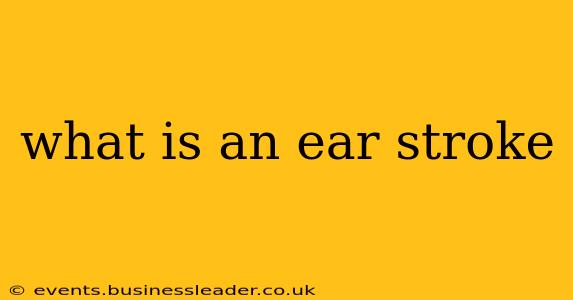The term "ear stroke" isn't a medically recognized term. There's no such thing as a stroke that exclusively affects the ear. However, a stroke can significantly impact hearing and balance, leading to symptoms that might be mistakenly attributed to an "ear problem." This confusion stems from the fact that the areas of the brain responsible for hearing and balance are often affected by cerebrovascular accidents (CVAs), commonly known as strokes. Let's clarify what actually happens.
What Happens During a Stroke Affecting Hearing and Balance?
A stroke occurs when blood supply to part of the brain is interrupted, either by a blocked artery (ischemic stroke) or a ruptured blood vessel (hemorrhagic stroke). The brain areas affected determine the resulting symptoms. If the stroke impacts the parts of the brain responsible for auditory processing (the temporal lobe) or vestibular function (inner ear and brainstem), individuals may experience various hearing and balance problems.
This can manifest as:
- Sudden hearing loss: This can range from a slight decrease in hearing acuity to complete deafness in one or both ears.
- Tinnitus: A persistent ringing, buzzing, or hissing sound in the ears.
- Dizziness or vertigo: A sensation of spinning or unsteadiness.
- Balance problems: Difficulty with coordination and maintaining equilibrium.
- Speech difficulties (aphasia): Problems understanding or producing speech.
Can a Stroke Cause Sudden Hearing Loss?
Yes, a stroke can absolutely cause sudden hearing loss (SSNHL). This is often unilateral (affecting one ear) and can be a sign of a more serious neurological event. The sudden onset of hearing loss should be considered a medical emergency and requires immediate attention.
What are the Symptoms of a Stroke Affecting the Ear Area (Brain)?
The symptoms are not limited to the ears themselves. Recognizing the classic signs of a stroke is crucial for prompt treatment:
- Sudden numbness or weakness of the face, arm, or leg, especially on one side of the body.
- Sudden confusion, trouble speaking, or understanding speech.
- Sudden trouble seeing in one or both eyes.
- Sudden trouble walking, dizziness, loss of balance or coordination.
- Sudden severe headache with no known cause.
If you experience any of these symptoms, immediately seek emergency medical assistance. Time is of the essence in stroke treatment.
How is a Stroke Affecting Hearing and Balance Diagnosed?
Diagnosing a stroke involves a combination of methods:
- Neurological examination: A doctor will assess your reflexes, coordination, and cognitive function.
- Imaging tests: CT scans or MRI scans are used to visualize the brain and identify the location and extent of the stroke.
- Audiological evaluation: Hearing tests will determine the type and severity of hearing loss.
- Balance testing: This assesses your vestibular system's function.
What is the Treatment for a Stroke Affecting Hearing?
Treatment focuses on managing the stroke itself and its consequences. This may involve:
- Medication: To dissolve blood clots (thrombolysis) or manage blood pressure.
- Rehabilitation: Speech therapy, physical therapy, and occupational therapy can help regain lost function.
- Hearing aids or other assistive devices: To improve hearing ability.
- Vestibular rehabilitation: To improve balance and reduce dizziness.
It's critical to remember that while symptoms might seem localized to the ear, the underlying cause could be a stroke affecting the brain. Prompt medical attention is essential for the best possible outcome. This information is for educational purposes only and should not replace professional medical advice. Always consult with a healthcare provider for any health concerns.
